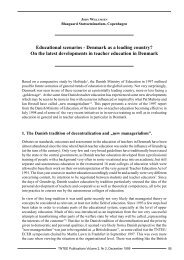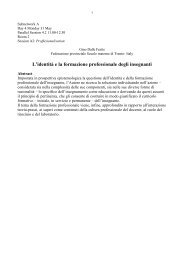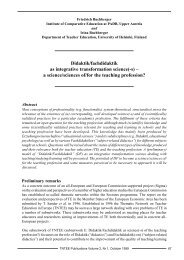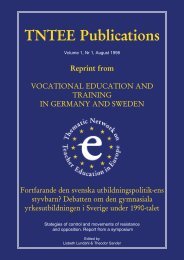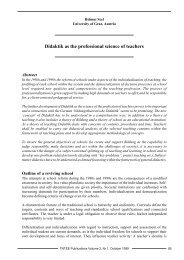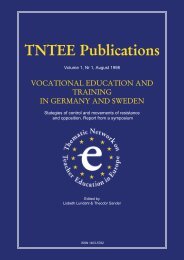TNTEE Publications - Didaktik/Fachdidaktik
TNTEE Publications - Didaktik/Fachdidaktik
TNTEE Publications - Didaktik/Fachdidaktik
Create successful ePaper yourself
Turn your PDF publications into a flip-book with our unique Google optimized e-Paper software.
Writing from a Finnish perspective in which TE is included within the university system at every<br />
level, S-E Hansen and C-G Wenestam identify two central dimensions of teacher education in<br />
chapter 9. The first one is defined by the applied work that is carried out by teachers in their day to<br />
day practice. The second aspect is the knowledge formation that gives the understanding of the<br />
nature of teachers’ work. They propose that it is the latter dimension that should be founded on<br />
scientific principles but that in general internationally teacher education does not offer the scientific<br />
training that is seen as fundamental to a profession. The dualistic nature of teacher education is seen<br />
to raise problems and difficulties with regard to what should be included. They argue for two<br />
principles that should govern teacher education. Firstly is the proposal that teacher education is an<br />
academic scientific discipline, in the same sense as for the medical profession. The implications of<br />
this approach are that the foundations for the education of student teachers must be scientifically<br />
based on scientific knowledge. It also implies that teacher education is a scientifically defined area<br />
where knowledge can be accumulated. They argue that this contradicts to some extent the<br />
apprenticeship model of teacher education. According to this perspective, the question of what<br />
knowledge is needed in teacher education and how knowledge can be accumulated is of central<br />
interest. The second key principle to govern teacher education is the importance of educational<br />
research and the close relationship between research and teaching in Finnish departments of teacher<br />
education. They draw on Kansanen’s ideas in proposing that the kind of reflective thinking that<br />
teacher education is trying to promote starts from a research-based approach, which is aimed at<br />
permeating the whole of teacher education. The research-training element is intended to enable the<br />
student to acquire an understanding and way of reasoning about education in terms of its scientific<br />
qualities. They propose that this should result in students being able to discuss and argue by referring<br />
to scientific knowledge about educational practices rather than relying on “everyday thinking and<br />
magical or mystical arguments”.<br />
Section 2<br />
Specific Subject Didactics<br />
In chapter 10 Birgit Pepin discusses epistemologies, beliefs and conceptions of mathematics and its<br />
teaching and learning. In particular she addresses the theory and specifically how teachers’ beliefs<br />
and conceptions are manifested in their practices by drawing on a recent research study in England,<br />
France and Germany. The chapter begins with an exploration of the issues raised in the literature<br />
concerning epistemologies, beliefs and conceptions of mathematics and its teaching and learning.<br />
Secondly, it analyses the ways in which mathematics teachers’ classroom practices in England,<br />
France and Germany reflect teachers’ beliefs and conception of mathematics and its teaching and<br />
learning. The findings of the research study suggest that teachers’ beliefs and conceptions are<br />
manifested in their practices and can be traced back to philosophical traditions of the three countries,<br />
to epistemological and educational trends of mathematics and mathematics education, and to personal<br />
constructions. It is suggested that teachers’ pedagogical styles are a personal response to a set of<br />
assumptions about the subject and its teaching and learning, to a set of educational and philosophical<br />
traditions, and to a set of institutional and societal constraints. Thus, it is argued that teachers’<br />
pedagogies need to be analysed and understood in terms of a larger cultural context and in relation<br />
to teachers’ conceptions and beliefs, and that a lack of such understanding is likely to inhibit the<br />
process of change at all levels of the system.<br />
Mathematics education is also the focus of chapter 11 by Brian Hudson, Hans-Jorgen Braathe,<br />
Sigmund Ongstad and Birgit Pepin. This chapter outlines the rationale for the development of the<br />
module on Mathematik <strong>Didaktik</strong> as a part of an electronic web-based “text book”. The overall<br />
approach to the development of the module is based on a model of teaching-learning as an “integrative<br />
transformative science” with reference to the contribution by Friedrich Buchberger and Irina<br />
<strong>TNTEE</strong> <strong>Publications</strong> Volume 2, Nr 1, October 1999 7



